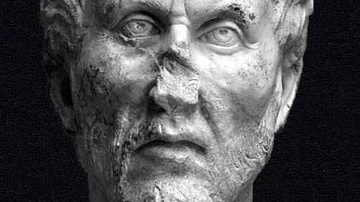Search
Search Results

Video
The Ancient Greeks: Crucible of Civilization - Episode 3: Empire of the Mind
EPISODE 3: EMPIRE OF THE MIND The final segment describes how Athens, at the height of her glory, engaged in a suicidal conflict with her greatest rival, Sparta. Through the eyes of Socrates, Athens' first philosopher, viewers see the tragic...

Book Review
Thinking Big: How the Evolution of Social Life Shaped the Human Mind
Thinking Big: How Evolution of Social Life Shaped the Human Mind, by Drs. Clive Gamble, John Gowlett, and Robin Dunbar, explores the prehistoric and ancient origins of our social lives in a mere 224 pages. Divided into seven chapters...

Definition
Anaxagoras
Anaxagoras (l. c. 500-c. 428 BCE) was a Pre-Socratic Greek philosopher who claimed the First Cause of existence was Mind (nous) and all things were constituted of indestructible “seeds” (or “stuff”), originally a single mass, separated and...

Definition
Mandala
A mandala (Sanskrit for “circle”) is an artistic representation of higher thought and deeper meaning given as a geometric symbol used in spiritual, emotional, or psychological work to focus one's attention. The image first appears in India...

Video
The Babylonian mind
Trace the legacy of Babylonian discoveries and ideas, including their mathematical system based on 60 and their desire to predict the future. With British Museum curator Irving Finkel. http://www.britishmuseum.org/about_this_site/audio_and_video/exhibitions_-_archive/babylon_-_video_archive/babylonian_mind_video.aspx...

Definition
Plotinus
Plotinus (c. 204-270) was a Platonic philosopher born in Lycopolis, Egypt. Although the story of his life was written down by his student Porphyry, few biographical details are included because Plotinus rejected the physical world of appearances...

Definition
George Berkeley
George Berkeley (1685-1753) was an Anglo-Irish bishop and an empiricist and idealist philosopher. He infamously claimed that no matter exists outside of God and that things only exist outside of our minds and perceptions because God perceives...

Definition
Archelaus (Philosopher)
Archelaus of Athens (l. c. 5th century BCE) was a Pre-Socratic philosopher in ancient Greece who claimed the first cause of existence was the opposition of cold and heat which caused the separation of the universal essence to produce a plurality...

Definition
René Descartes
René Descartes (1596-1650) was a French mathematician, natural scientist, and philosopher, best known by the phrase 'Cogito ergo sum' ('I think therefore I am'). He published works on optics, coordinate geometry, physiology, and cosmology...

Definition
Wonhyo
Wonhyo (l. 617-686 CE) was a Korean Buddhist philosopher whose works impacted a wide array of later philosophers and writers through his teaching that one’s interpretation of the world created one’s reality. He is highly regarded as the greatest...